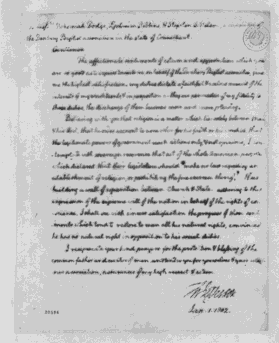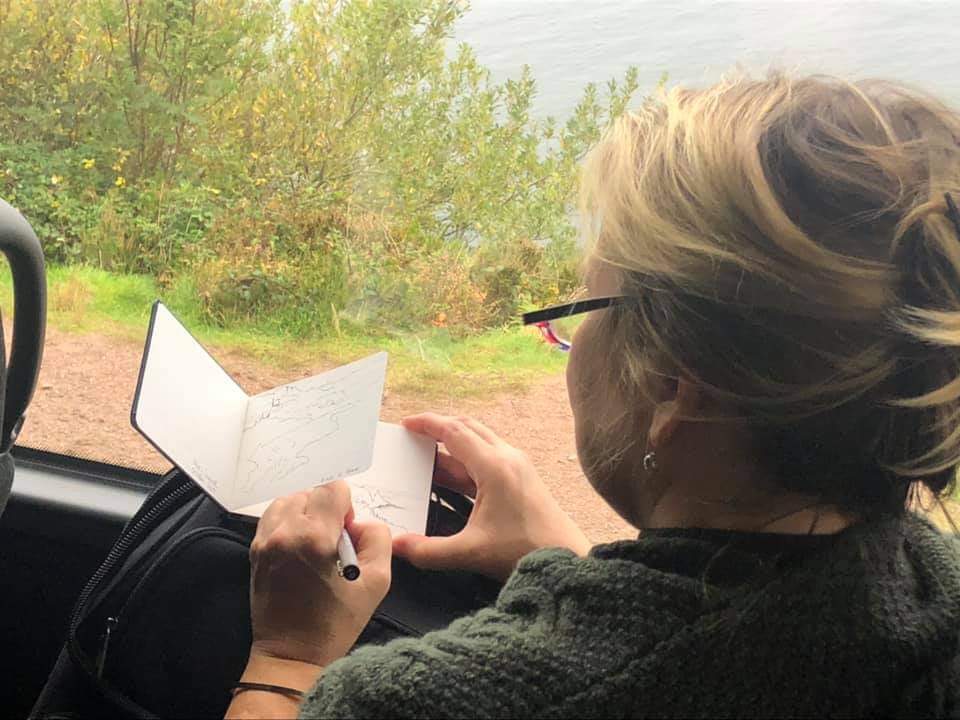 Thomas Jefferson's 1802 letter to Danbury Baptist Association Thomas Jefferson's 1802 letter to Danbury Baptist Association I contemplate with sovereign reverence that act of the whole American people which declared that their legislature should 'make no law respecting an establishment of religion, or prohibiting the free exercise thereof,' thus building a wall of separation between church and State. —Thomas Jefferson in an 1802 letter to the Danbury Baptist Association, Connecticut Dear Disciples, As we approach July 4 with its celebration of the Declaration of Independence and the birth of our country, it’s fitting for Christians to reflect upon the role of religious liberty in our nation’s history and in our current day. The living out of the ideals of religious liberty has always been complicated and messy, as our country has wrestled with adjudicating among competing interests. Democracy is hard work, after all. Despite protests to the contrary in certain vocal Christian circles, the idea of the separation of church and state does not sideline people of faith. The first amendment offers protection for religious communities from interference from the secular state, regardless of their position of influence in our larger society. The flip side of that protection is equally vital—religious communities are restrained from imposing particular religious views onto society at large. When one particular religious institution aligns itself with government power in order to legislate its particular worldview onto others, our rights to religious liberty are diminished. One of the rallying mottos long embraced by the Christian Church (Disciples of Christ) is “In essentials unity, in non-essentials liberty, in all things charity.” The maxim predates our founding as a denomination, first appearing in Lutheran and German Reformed churches in the 17th century. While not unique to Disciples the motto has been a distinctive of our religious identity, affirming together that “Jesus is the Christ,” and also embracing individual discernment of matters of faith and morality. Disciples recognize that people of faith will have varying views on ethical issues, and we have long struggled to live out that commitment to diversity of belief while maintaining a welcoming faith community and living out our understanding of God’s call to justice. Among several recent troubling rulings from the Supreme Court is the opinion in Kennedy v. Bremerton, which upends protections for public school students from teacher-led religious practices. A Christian high school football coach regularly offered prayer in the middle of the football field immediately following games and also gave Christianity-laced motivational talks in the locker room. Apprised of his actions the school administration told the coach he could pray privately, but he could not lead students in prayer while he was on the job. They offered accommodations so that the coach might continue his private prayers in a less conspicuous place. Let me be clear: the coach could have prayed on the sidelines, privately in the press box, in his car on the way home, and in any number of other places. Instead, after finding legal backers who were looking for a Supreme Court fight, the coach resumed praying on the field at the 50 yard line. He was subsequently fired. At issue was not the coach’s freedom to practice his faith through personal prayer at his place of employment, but rather his performance of a religious act in such a way that students, players, or staff might feel pressured into participation. This Supreme Court decision seriously weakens the rights of families to raise their children according to their own religious or secular traditions. As people of faith who hold to the idea of personal liberty with respect to religious practices, this decision by the court should trouble us. Alexander Campbell would write in his memoirs that the United States was “a country happily exempted from the baneful influence of a civil establishment of any peculiar form of Christianity, and from under the direct influence of an anti-Christian hierarchy." I fear we have entered a time in which such dedication to religious liberty for all no longer holds sway.
0 Comments
Your comment will be posted after it is approved.
Leave a Reply. |
AuthorA native of Illinois, Rev. Nancy Gowler lived for 26 years in the Pacific Northwest. She joined the ministry of First Christian Church in Morehead, KY, in July of 2020. Archives
January 2023
Categories
All
|

 RSS Feed
RSS Feed
